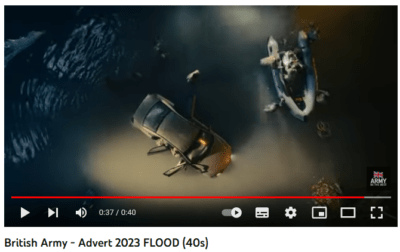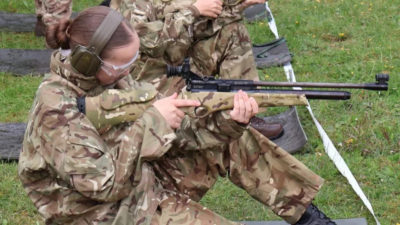Unpicking British Army recruitment adverts

Searchlights pass over a disaster scene at night as the camera surveys a flooded residential area. A helicopter can be heard flying low over partially submerged cars whilst soldiers in combat uniform wade through the water among the vehicles. The camera discovers a young black soldier. Then we flashback. The soldiers are in the back of a truck on the way to the disaster scene. One wields a small high-tech device as it guides them to the location of the emergency. They arrive and pour off the vehicle into the water.
The soldiers find a woman trapped in the driver’s seat of a flooded vehicle – she gestures frantically to the back seat where there is a baby. The young black soldier, established early as the main protagonist, opens the passenger door and lifts the child out. He holds it close and talks reassuringly to it. The camera lingers over this tender moment. The soldier lifts the child to the mother, who is now safe, wearing a space blanket in a dinghy. In this final phase of the advert, during which the soldier looks tired and relieved, a voice over tell us: “The army is more advanced than ever, but nothing can do what a soldier can do.”
The new British Army recruitment advert, titled The Flood, manages to cram quite a lot in: diversity, a critique of technology, the primacy of the military human, the military’s supposed usefulness outside of the battlefield. But watching this new ad, with its action, emotion and dramatic sweep, it is hard not to note some dubious claims in its presentation.
A Deluge of Critique
Indeed, the advert drew a wide range of critique on social media. Not just from anti-militarists, but from emergency rescue workers and ex-military personnel. Rescue expert Dr Mike Rennie, himself a veteran, said the advert showed a dearth of knowledge about water rescue. Others pointed out the lack of specialist equipment carried by the soldiers like dry suits and even life jackets. While others noted that the soldiers could be rescuing their own families from sub-standard military housing – a matter which has surfaced again in the press recently.
Another pointed out that the soldiers seemed to have inexplicably removed their helmets – the only protective equipment in the advert – before mounting their rescue attempt. And one commenter quipped about soldiers scabbing on emergency workers; the use of the army as a stand in for striking paramedics and Border Force staff an issue which is in the public consciousness as industial action continues across the UK.
It is also notable that this is an entirely military rescue operation. No emergency service workers are visible, which seems to defy the reality of civil-military operations where military personnel support, rather than replace, civilian firefighters and medics for example. According to the British Government, a breakdown of the kind of tasks military personnel undertake during these kind of operations might include:
‘[Filling] and distributing sandbags, erecting barriers, assisting residents, examining the condition of existing flood defences and general duties in support of the emergency services.’
Essentially, it seems improbable that military personnel would be involved directly in a rescue of the kind represented in the advert. In fact, one former general, Richard Barrons, told Forces News he felt there was a danger of misrepresentation:
‘There might be a sense that the Army is selling itself as that’s what it does, it does flood relief, and not what an army really is which is an organisation that does industrial-scale violence, that kills people and breaks their stuff, faster than it can be done to us, in the best interests of our nation, and in accordance with the law.’
Critical tweets and a general’s commentary may not be enough to sink the advert, but they do hint at a certain amateurish execution and a poor grounding in reality that hasn’t generally been a feature in recent campaigns.
Tech vs Empathy
As with all recent recruitment adverts, The Flood is a joint project between Capita, the British Army and Accenture, which forms part of a wide ranging campaign under the hashtag #FindWhereYouBelong. Shorter online adverts were also released across social media platforms in January and February, but, interestingly, within the more restricted viewing parameters of social media feeds, some of these adverts present images of traditional warfighting. Recent Facebook posts on Army Jobs also push apprenticeships and Harrogate’s foundation college, in a well-practiced appeal to teenagers.
According to Naomi Walter, head of media at Capita, The Flood spotlights the role the army, including its reservists, play in the UK and taps into “the key motivations to drive applications”. Putting aside the issues we’ve already outlined, it is an interesting claim given there is little to mark out any of the soldiers as reservists. Indeed, once in uniform, and without looking at unit badges or particular insignia, there is little visible difference between regular or part-time troops.
Elsewhere, a sympathetic write-up in PR magazine MediaShotz describes the film as ‘a powerful portrayal of the instincts and empathy of British soldiers’ showing that, despite the important of technology, ‘it is a solider and their human intuition that makes all the difference’.
This is starkly different from the sci-fi themed video we analysed in September 2022. That offering saw a Terminator-esque war robot loping across a battered landscape before morphing into a group of soldiers operating a small drone. The underpinning motto, though, was the same: that the military human trumps all technology. In fact, what is really apparent in this latest advert is how pared down the technologies are. Apart from the flash of a military iPad and brief cut to what appears to be the view from a drone overhead, this is a vision devoid of technology in which even combat helmets are quickly abandoned.
However, the now customary nod to diversity in British Army recruitment adverts did carry across into the new release. The Flood centres a young black soldier, while in last year’s offering a young woman was positioned as the key protagonist. Gone, however, was the nod to Kitchener nostalgia seen in the launch video and touched upon previously in the infamous ‘Millennials’ campaign of 2019.
Off Target
The British Army struck up its agreement with outsourcing giant Capita back in 2012, forming the Recruiting Partnering Project (RPP). Money committed to the RPP was an eye-watering £1.3bn, with Capita getting £495 million for its alleged expertise in recruitment and marketing. However, with intake targets repeatedly missed the partnership has come under intense criticism from MPs on all benches. Despite the scrutiny, Capita were awarded a two-year contract extension last March – seemingly off the back of hitting 100% of recruitment targets for regulars and 95% for reserves in 2019/20.
Interestingly – and perhaps to deflect from issues with hitting targets – Capita count the new marketing focus of This Is Belonging as one of their greatest achievements working with the MoD. According to the company, the ‘campaign continues to tackle many stereotypes and traditionally contentious issues head-on, particularly ethnicity, gender and sexual orientation, and has transformed the numbers of applications from nearly all demographics and target groups’. Yet, this approach has also received its fair share of criticism, some of which echoes that levelled at The Flood.
This critique was also a frank appraisal of military life that cut through the facade of British Army recruitment adverts under Capita. Back in 2018, after a new round of adverts were released, the retired Major General Tim Cross reportedly said recruits needed to know the army ‘is not going to be soft and we are not going to be nice to people’. But it also irked the top brass in other ways. In a sign of how deeply conservative the upper echelons of the military is, serving Colonel Richard Kemp claimed the campaign showed the army was ‘being forced down a route of political correctness’. No doubt a precursor to the bizarre claim that the RAF’s recent diversity drive discriminated against white men.
An arguably dishonest shift in focus away from the army’s actual function towards something more morally palatable. Perhaps those designing the advert felt emboldened by the domestic roles soldiers have increasingly been asked to perform since the start of the pandemic.
With the new advert, there is return to this narrative of presenting the army in less conventional ways. According to Accenture Song’s chief creative Nik Studzinski:
‘Focusing on the instincts and humanity of British soldiers, supporting communities in crisis a little closer to home, felt like a story that needed telling. The flood scenario resonates because it affects us all. And it shows a different side to the Army, one that’s less focused on conflict-based concerns overseas.’
Yet, as the wide ranging critique on social media proves, it is a story largely based on fiction in which a notion of heroic service to community is advanced. An arguably dishonest shift in focus away from the army’s actual function towards something more morally palatable. Perhaps those designing the advert felt emboldened by the domestic roles soldiers have increasingly been asked to perform since the start of the pandemic. Roles that are as equally based on fiction and optics – standing in for paramedics without being allowed to respond to emergencies or operating on the sidelines of Nightingale hospital contruction despite claiming otherwise. The army even turned the latter into a recruitment opportunity – as they did with the pandemic at large.
Then there is the fact that personnel themselves are unhappy at performing such tasks. In December, the Financial Times reported on how morale in the UK military is suffering as a result of the government increasingly turning to the army to fulfill civilian roles.
There’s no doubt The Flood is another high-value, dramatic installment. It does a lot of what it was meant to do: spotlights diversity, humanises military personnel, positions the military in the homeland and steps away from warzones. But it also caused a backlash its creators were definitely not expecting – and, in the process, lifted the veil on British Army recruitment advertising to a much broader audience.
If you know someone who is considering a career in the military please ensure they make an informed choice. Visit Before You Sign Up to help them better understand what a military career entails.
See more: recruitment, advertising, reserves
Like what you read?
> Sign up for our newsletter or blog notifications
> Support our work – from just £2 a month










